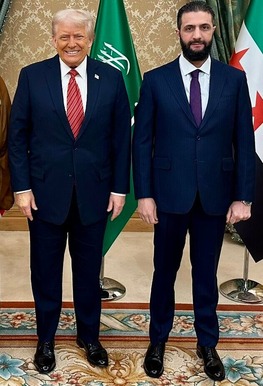Historic shift marks new era in US-Syria relations after years of hostility
In a dramatic reversal of longstanding US policy in the Middle East, Syria will officially join the international coalition to combat the Islamic State (IS) group, a senior Trump administration official confirmed on Monday. The announcement came as President Donald Trump hosted Syrian President Ahmed al-Sharaa at the White House — the first visit by a Syrian leader to Washington in history.
The move represents a milestone in regional diplomacy and a striking transformation in the relationship between Washington and Damascus. Al-Sharaa, who only months ago was still listed by the US government as a terrorist, described the visit as part of a “new era” of cooperation between the two nations.
“This marks a new chapter in Syria’s relations with the world,” al-Sharaa said in an interview with Special Report on Fox News. “We are entering a phase of collaboration, not confrontation, especially with the United States.”
Syria Becomes 90th Member of Global Anti-IS Coalition
Syria’s inclusion brings the number of coalition members to 90, joining efforts to eliminate remaining IS strongholds and to prevent the flow of foreign fighters into the Middle East. The decision also underscores what Trump officials describe as a pragmatic shift in US foreign policy — focusing on counter-terrorism results rather than ideological labels.
A senior administration official confirmed that the US Treasury, State, and Commerce Departments will soon unveil measures to ease economic restrictions on Syria and offer “compliance clarity for investors.” The steps will include a temporary 180-day suspension of the Caesar Act, a sanctions law enacted in 2019 that targeted the former Syrian regime.
Trump Hails “New Beginning” for Syria
Speaking to reporters in the Oval Office after his meeting with al-Sharaa, President Trump said he believed the Syrian leader could transform his war-torn country.
“We want to see Syria become a country that’s very successful,” Trump declared. “And I think this leader can do it. I really do.”
The two leaders have met privately twice before — once in May during the Gulf Cooperation Council summit, and again at a dinner on the sidelines of the UN General Assembly in September. However, Monday’s White House meeting marks the first formal bilateral engagement between the nations since diplomatic ties were severed in 2012.
Officials confirmed that the US will now allow Syria to re-open its embassy in Washington, signalling the resumption of diplomatic relations after more than a decade of isolation.
From Extremist Commander to Head of State
Al-Sharaa’s rise from militant commander to recognized world leader represents one of the most remarkable political transformations in recent memory. Once a key figure within Al-Qaeda, the organization responsible for the 9/11 attacks, he later led Hayat Tahrir al-Sham, an Islamist faction the US designated a terrorist group until just four months ago. The Treasury Department officially removed him from its “global terrorist” list last week, following his ascent to Syria’s presidency.
Since assuming power, al-Sharaa has sought to project a more moderate image, focusing on reconstruction and reconciliation after 13 years of civil war. In his interview with Fox News, he said his talks with Trump centred on Syria’s “present and future,” emphasizing economic rebuilding and partnership rather than his militant past.
Controversies and Challenges Ahead
Despite his new global standing, al-Sharaa’s rule has been shadowed by reports of sectarian violence involving Syria’s Alawite minority and deadly clashes between Sunni Bedouin and Druze militias. He has pledged to purge members of his security forces implicated in human rights abuses, vowing to hold them accountable.
President Trump, meanwhile, continues to publicly support al-Sharaa, often referring to him as a “fighter” and even calling him a “young, attractive guy.” In June, Trump signed an executive order lifting sanctions on Syria, saying the move was intended to help foster “stability and peace.”
At the time, the White House said it would closely monitor Syria’s progress — particularly its willingness to normalize ties with Israel and act against foreign terrorist groups operating within its borders.
A Delicate Re-Engagement
The rapid normalization between Washington and Damascus marks a stunning geopolitical pivot. Analysts say it reflects Trump’s transactional approach to foreign policy — rewarding cooperation and results over past hostilities.
As Syria officially joins the global coalition against IS, both leaders are betting that shared interests in regional security can outweigh lingering mistrust. For Trump, it’s a chance to tout a major diplomatic breakthrough in the Middle East. For al-Sharaa, it’s a path to global legitimacy after years as an international pariah.
Whether this fragile alliance can endure — and whether Syria’s new leader can deliver on promises of peace and reform — remains to be seen. But for now, both Washington and Damascus are calling it a “new era” of cooperation against extremism in the Middle East.






